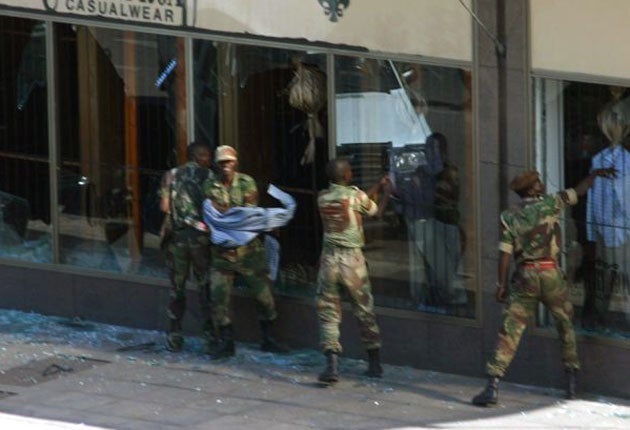Mugabe seeks revenge on soldiers that rebelled
Zimbabwe's state security begins to break down after soldiers vent anger at economic collapse

Your support helps us to tell the story
From reproductive rights to climate change to Big Tech, The Independent is on the ground when the story is developing. Whether it's investigating the financials of Elon Musk's pro-Trump PAC or producing our latest documentary, 'The A Word', which shines a light on the American women fighting for reproductive rights, we know how important it is to parse out the facts from the messaging.
At such a critical moment in US history, we need reporters on the ground. Your donation allows us to keep sending journalists to speak to both sides of the story.
The Independent is trusted by Americans across the entire political spectrum. And unlike many other quality news outlets, we choose not to lock Americans out of our reporting and analysis with paywalls. We believe quality journalism should be available to everyone, paid for by those who can afford it.
Your support makes all the difference.An army investigation was underway in Zimbabwe last night after President Robert Mugabe's loyal generals vowed to take strong measures against junior soldiers who rampaged across Harare to vent their anger at their suffering in the country's economic collapse.
The soldiers' violence was the latest indicator of the dramatically worsening crisis in which thousands are dying of a cholera epidemic. The World Health Organisation put the death toll at 500, but a senior health ministry official has told The Independent the real toll is nearer to 3,000. The WHO said "cholera outbreaks in Zimbabwe have occurred annually since 1998, but epidemics never reached today's proportions".
State hospitals and clinics have been shut across the country and the lack of money to buy water treatment chemicals means many major urban centres have not had clean water for over a year. Because of the breakdown in the water system, residents are having to drink from contaminated wells and streams.
"There is a general sense that everything is beginning to break down," said a senior Western diplomat, who described the situation in Zimbabwe as "low-grade anarchy" rather than a "mutiny".
In a clear sign that President Mugabe's hold on his state security machinery is starting to crumble, his once-loyal soldiers ran amok across the capital on Monday after they failed to access their paltry wages in the cash-strapped banks. The unarmed soldiers fought with heavily-armed police and several were arrested.
It was the third outbreak of such violence since last Thursday. The sight of rampaging soldiers was then unprecedented. Army sources said an inquiry had already begun, with dozens facing courts martial. Unconfirmed reports say three of the 12 soldiers who took part in Thursday's riot have been killed.
A sizeable body of Mugabe's fiercely- loyal generals were co-ordinating a plan to crush any likely mutiny from within the army. This had begun with the deployment of an internal crack unit, the military intelligence, to seek out those soldiers suspected of disloyalty.
As a result hundreds of fearful junior soldiers had stopped reporting for duty. Mass desertions are likely to follow.
"Many of them will be kept away from the armouries because of suspicions of disloyalty. They simply won't have the means to stage a full-scale coup or embark on any sustainable revolt," said a middle-ranking army officer who did not want to be named.
He spoke of widespread disenchantment within the army spawned by the economic crisis. Soldiers' salaries are now the equivalent of five US cents per month. The food rations they used to get to supplement meagre salaries have been stopped because imports have dried up because of the lack of funds. Instead, soldiers are being asked to bring food from home. Their salaries, barely enough to cover a day's bus fare, could not be drawn from the banks because of a cash shortage.
Despite these hardships, the sources said the mistrust within the army militated against any co-ordinated mutiny. Soldiers cannot trust each other because of spying by military police. President Mugabe has disbanded the presidential guard division and reconstituted it with well-armed faithful soldiers, mostly from his Zezuru clan. Other military units are not so well resourced. Defence Minister Sydney Sekeramayi, flanked by army generals Constantine Chiwenga and Philip Sibanda, condemned the rebellious soldiers and warned of tough action against them, at a press briefing attended by mostly state media in Harare. He vowed to bring the culprits to justice.
Mr Sekeramayi also warned the Zimbabwe Congress of Trade Unions against going ahead with a planned nationwide strike to protest against the cash shortages today.
He questioned the coincidence between the actions of the soldiers and the strike call, suggesting that labour leaders were trying to engineer a coup. "Let me emphasise that those who may try to incite members of the uniformed forces to indulge in illegal activities will be equally found culpable," he said.
Zimbabwe in numbers
231,000,000% Inflation rate in July, the last month for which data is available.
90% Unemployment rate estimate. More than three million are thought to have fled, mostly to South Africa, in search of work and food.
Join our commenting forum
Join thought-provoking conversations, follow other Independent readers and see their replies
Comments